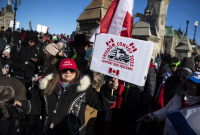Support strong Canadian climate journalism for 2025
Indigenous leaders from across Ontario called Wednesday for the repeal of a new housing bill they said was passed without properly consulting First Nations and could put their communities at risk.
The Chiefs of Ontario, which represents 133 First Nations, said Bill 23 could fast-track projects that might have adverse affects on Indigenous lands, waters, wildlife and treaty rights.
Speaking at a chiefs' gathering of the Assembly of First Nations in Ottawa, the group said the province had failed to engage meaningfully with First Nations before passing the legislation late last month, despite a constitutional requirement to do so.
"This bill is an enormous threat to First Nation jurisdiction, as well as inherent and treaty rights," said Reginald Niganobe, the Grand Council Chief of the Anishinabek Nation.
"Attempts at correspondence with the government of Ontario have gone unanswered ... the government needs to be held accountable for the blatant disregard of our nation-to-nation relationship."
Premier Doug Ford's government passed Bill 23 as part of its plan to build 1.5 million homes in 10 years but critics have said it will lead to higher property taxes, weaken conservation authority powers and not actually make homes more affordable.
The province said Wednesday that it is committed to meeting its constitutional duty to consult with Indigenous communities and creating a meaningful relationship with them while looking to "advance prosperity for all Ontarians."
"The government is taking a balanced approach to help our municipal partners plan for responsible growth and help build housing where it makes sense, while protecting the environment," Matt Carter, spokesperson for the Ministry of Municipal Affairs and Housing, wrote in a statement.
Municipal Affairs and Housing Minister Steve Clark has said Bill 23 received an endorsement from Ontario Aboriginal Housing Services, but Niganobe said that does not constitute engagement with First Nations since the organization does not hold treaty rights.
Niganobe further accused the province of delegating consultation to municipalities, which do not have a constitutional duty to consult with First Nations as their governments are not considered part of the Crown. Clark previously said municipalities "have a role to deal with our Indigenous partners."
In addition to Bill 23, the Progressive Conservative government also recently revealed plans to open some areas of protected Greenbelt land to development and is allowing mayors of Toronto and Ottawa to pass bylaws with just one-third council support on matters related to provincial priorities, such as housing.
Chief Kelly LaRocca of the Mississaugas of Scugog Island, located near Greenbelt lands, said the region's natural and agricultural lands are disappearing at an alarming rate to development.
"Developing the Greenbelt will irrevocably damage the environment, Indigenous rights, public health and any progress made towards Indigenous reconciliation," said LaRocca.
"We ask that the province repeal Bill 23 and not pursue any significant planning reforms until such time it addresses its legal and democratic failures."
She said the Ford government has forced Indigenous Peoples to consider options including litigation.
Chief Laurie Carr of the Hiawatha First Nation said she's concerned the new housing law will lead to the destruction of wetlands and woodlands in traditional territories.
Other chiefs invited Ford to their communities to discuss housing needs, which they said remain unaddressed in the province's new housing plan.
The Chiefs of Ontario said it will be meeting with First Nations leadership to further discuss how the legislation may affect Indigenous communities and the steps it could take on the matter.
— With files from Allison Jones.
This report by The Canadian Press was first published Dec. 7, 2022.
This story was produced with the financial assistance of the Meta and Canadian Press News Fellowship.




Comments
As one always suspected, once again Ford's PC government has glaringly demonstrated their abject failure to understand/execute the legal, jurisdictional, democratic, and politically urgent requirements of Federal and Provincial Governance in Canada. Without question it is complex. Without question, the impatient, would be demagogues, who are always on the edge of boiling over in our provinces, are flexing their muscles with pretensions to "sovereignty" - which, as the name suggests, resides at the highest reaches of governance. They abuse the constitution and the notwithstanding clause as their step-ladder to the Olympian heights of sovereignty. Our Sovereign nation for it's part, forgets that Federal sovereignty exists at the will of the populace. Real people who actually live and breathe in the neighborhoods, Municipalities, Reserves and Provinces/Territories our Capitol so cavalierly ignores; the better to corral the taxes, the corporate political donations, etc. - the fossil fueled grease it needs to function.
At this rate Canada's Supreme Court will be busy for generations sorting out the jurisdictional chaos; striving for the equity, the balance, our politicians have abandoned.
The Supreme Court could use some assistance. Perhaps electoral reform in the shape of proportional representation is overdue. Baldwin and LaFontaine began the process of electoral legitimacy in British North America by adhering to the principles of Representation and Responsibility. They would no doubt recognize proportional representation as a needful advance on the primitive electoral system of first past the post.
Although I mentioned Reserves in the list of jurisdictions Ottawa ignores I failed to expand on the news that the US Congress is FINALLY, seriously, considering fulfilling an old promise, to give the Cherokee Nation representation in the House, alongside entities like its claimed offshore territories/dependencies. A promise so long delayed that its denial was almost an unwritten constitutional amendment.
It is long overdue that Canada should do no less for consortia of its First Nations. Permanent seats in Parliament, filled by the votes of those deemed to be descendants of Canada's First Nations, would be a welcome manifestation of true reconciliation.